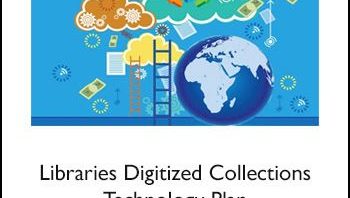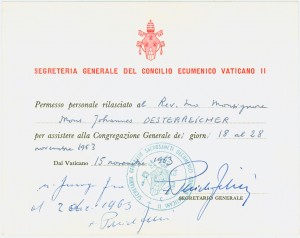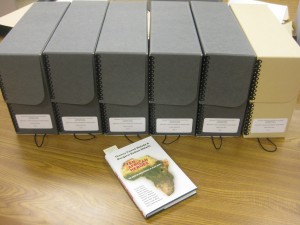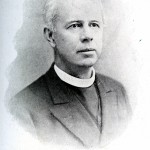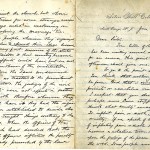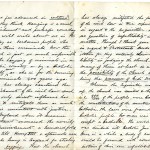Author captures events, individuals and spirituality that have marked the growth
(South Orange, NJ) – On Wednesday, April 13, 2011, Monsignor Robert James Wister will mark the publication of his new book, Stewards of the Mysteries of God: Immaculate Conception Seminary, 1860 – 2010, with a signing in the Dean’s Suite of Walsh Library at 3 p.m.
With this new narrative, Wister has provided a detailed, scrupulously researched and well-written historical treatment of the University’s Immaculate Conception Seminary.
“The story of the Seminary is a fascinating study of the religious, political, social, and ethnic history of New Jersey,” says Wister. “No aspect of regional or local history has failed to have an impact on the Seminary, and through its graduates, the Seminary has had a great and positive effect on society in general.”
The major seminary of the Archdiocese of Newark is currently in the midst of celebrating 150 years of forming priests for God’s people, with Sesquicentennial festivities continuing through December 2011. For a complete list of dates and events, visit theology.shu.edu.
“We are approaching a great time in the history of Immaculate Conception Seminary,” says Monsignor Robert Coleman, Rector and Dean. “As one of the very few seminaries founded before the Civil War which continues to serve the Church’s mission today, we rejoice in the great history of these 150 years and are filled with hope and confidence for a future of continued growth and service.”
Founded in 1860 by Bishop James Roosevelt Bayley, Immaculate Conception Seminary was first known by many as the “Diocesan Seminary” and the “Ecclesiastical Seminary.” A staple of Seton Hall College, its first class consisted of nine enrolled seminarians. Today, its rich and diverse student body represents such countries as Nigeria, Poland, Nicaragua and the United States. Its various academic offerings include a Master of Arts in Theology and a Master of Arts in Pastoral Ministry, in addition to its Master of Divinity. In 2007, the Seminary also added a Bachelor of Arts in Catholic Theology to its repertoire, which enrolled 95 students as of last fall.
Though Immaculate Conception Seminary continues to evolve over the passing years, its core focus remains unchanged: to provide the human, spiritual, intellectual and pastoral formation needed for priests to serve the Catholic Church.
“It is important to recognize that in the midst of so many challenges in the life of the Church, that the Seminary is a strong and healthy institution that will contribute to moving the Church forward, and bringing God’s Kingdom into the hearts of more people,” says Wister.
During the event, Wister will deliver a slide presentation with images and excerpts from this volume, and copies of the book will be available for purchase and autographs. Light refreshments will be served.
The event is free, and is open to the University community, as well as the general public. For more information, please contact
About Seton Hall University
For 154 years, Seton Hall University has been a catalyst for leadership, developing the whole student, mind, heart and spirit. Seton Hall combines the resources of a large university with the personal attention of a small liberal arts college. Its attractive suburban campus is only 14 miles by train, bus or car to New York City, with the wealth of employment, internship, cultural and entertainment opportunities the city offers. Seton Hall is a Catholic university that embraces students of all races and religions, challenging each other to better the world through integrity, compassion, and a commitment to serving others. For more information, visit: www.shu.edu.

